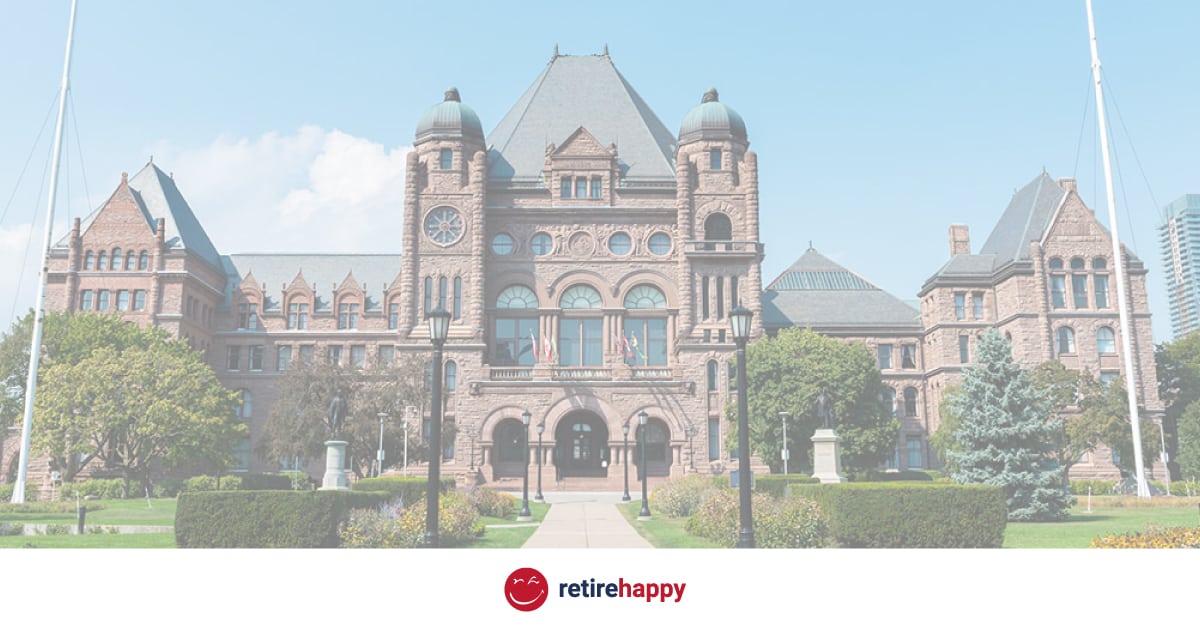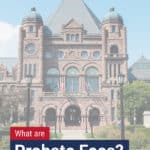What Are Probate Fees? (Plus, how to avoid them in Canada)

When doing retirement planning, I often come across people familiar with the term “estate taxes” after hearing it on TV or reading it in an article. People ask me if we have anything like that here in Canada. We do not. There is no such thing as estate tax in Canada on a deceased person’s estate, but we do have something called probate, and there is a cost.
What is probate?
Probate is the legal procedure that confirms a) that your will is valid and b) that the executor you appointed in your will is authorized to act in that capacity.
Probate may be required depending on the complexity and value of the estate.
How do probate fees work?
Probate fees are a tax charged by the government on an estate’s total value. The fair market value is comprised of various estate assets, including a primary residence, cottage or investment properties, and registered and non-registered investments – essentially any asset owned by the deceased’s estate.
Related Article: Choosing the right executor for your estate
How are probate fees calculated?
How probate fees are calculated varies by province. To illustrate, here is the probate fee schedule for two Canadian provinces:
British Columbia Probate Fees
- For estate values up to $25,000, there is no probate fee
- the gross value between $25,000 and $50,000 ($6 per $1000 or portion 0.6%)
- gross value over $50,000 ($14 per $1000 or portion 1.40%)
- An additional administration fee of $200 for estate values over $25,000.
Ontario Probate Fees
Ontario eliminated the estate administration tax for estates with a value of $50,000 or less, effective January 1, 2020. The new rates are as follows:
- $50,000 or less – no estate tax (probate fees)
- Over $50,000 – $15 for every $1000 or portion 1.50%
How to avoid probate
Depending on several factors, including the estate’s value, you will have to go through probate, and you won’t have a choice. Financial institutions often require probate to make sure the will is valid. You can take steps to reduce probate fees and ensure that when you pass away, most, if not all, of your estate goes to whom or where you want it to go.
Here are four ways you can reduce your estate assets while you are still living:
- Name a beneficiary. Make sure you name a beneficiary on items such as Life Insurance, RRSPs, RRIFs, Tax-Free Savings Accounts (TFSAs), and other Non-Registered assets at Insurance Companies. Naming a beneficiary ensures these monies flow outside your estate, avoiding probate.
Related Article: Designating Beneficiaries for RRSPs and RRIFs
- Give money away while you’re still living. For retirees with significant amounts of money, give some of it away. By doing so it is out of your hands and into the hands of a person who will be able to put that money to good use. Pay down a mortgage, pay off debt etc. Once it the asset is out of your hands, when you pass away it is not part of your estate.
- Transfer your accounts to joint owners with the right of survivorship. Joint Ownership can be a way to avoid probate fees but be careful; there can be some drawbacks. There is Joint Ownership with the Right of Survivorship and Joint Tenants in Common.Joint Ownership with a spouse on bank accounts, the home, and non-registered accounts is a good idea. Joint Ownership of children can have a negative impact before or after death, depending on the family dynamics. Make sure you do your research.
- Establish a trust. Trusts can also help in minimizing your estate. Testamentary Trusts are used at the time of death and can be a great tool for estate planning. Your trust will be managed by an estate trustee, who you will name in your will.
Dying without a will
Your will is the only way you can control what happens to your estate after you pass away. Dying without a will could see your estate divided among those you did not intend to receive money or receive the money soon.
If you pass away and are not married or common law, have a child, and have no will, your estate will go to your child. What if your child is a minor? You also want to decide who your executor will be.
It is always important to have a will so that your wishes are carried out as you want, not as the government would like.
Related Post: Executor’s checklist – What are the duties of an executor?
The bottom line on probate fees
My best advice is not to worry about probate fees. Use the steps I outlined above to reduce any estate administration tax while ensuring you aren’t compromising your financial position while still living. In other words, don’t give ALL of your personal property away.
We often make a bigger deal about probate fees than necessary, and sometimes the pressure comes from family members who may or may not have our best interests at heart. However, take time to know the costs and what you can do to minimize those costs.


Comments
Here’s a question that came up at a family gathering recently. How does one know that the Will being presented is the most recent? Is there a central national registry that an individual can check? Does probate do this? Will they know if a more recent Will was created in another jurisdiction (different province)? And not all Wills are probated. In my experience I’ve seen plenty of small estates where the financial institution doesn’t require it due to the size of the account. My dealer waives it for accounts under $75K.
Does the value of your home count in the total value of your estate for probate purposes? Or just invested assets?
At the suggestion of my mothers former bank advisor, I did the probate on her estate rather than going through a lawyer.
Part of the process in BC was going on line to the BC registry to check on registered wills. That took all of ten minutes at most.
I bought the $25 kit at Staples for BC Probate, followed the instructions. Took the forms to the courthouse for review. The clerk pointed out two errors. The clerk saved me a trip to the notary to get three of the forms certified. I think they charged $25 per certification.
I corrected them, took the forms back the next day along with a payment. Had three of the forms certified and submitted the package. Three weeks later Probate was approved.
Very straightforward, very easy.
The kit included a CD with all the required forms. Very detailed instructions covering various situations.
In Alberta, the maximum probate fee is $525, on estates over $250,000. Smaller estates have a reduced fee. No percentage is charged. See https://www.alberta.ca/court-fees.aspx under “Surrogate Matters”.
Are executor’s fees taxable income? Can a beneficiary gift an equivalent amount rather than having the estate pay the executor, and thus avoid taxes?
In the post under item #1 Name a Beneficary it lists various accounts (e.g., RRSP, TFSA) but that sentence ends with “assets at Insurance Companies”. What happens to such accounts that are held in a bank or online trading accounts such as Questrade, Etrade, etc.? If a beneficiary is named are these accounts do they avoid probate?
It’s not a big deal, but it still amounts to double (at least) taxation. I earned money and paid tax on it, I then bought a car, (with after tax money), and paid more tax on it. I died and left the car to my child – that child now needs to pay tax again (oh, sorry the government doesn’t call it tax it’s a probate fee) on that car. How many times should I have to share my money with the government? As an executor probate does nothing for you – it says, the will that we have seen appears to be in order and proper. It does not (realistically it can’t) guarantee that this is the most recent will and it still leaves the executor liable. So at the end of the day – why do it?
Why can we not have the same system as QUEBEC – no PROBATE REQUIRED – you just register your will and then no one can steal your money (including the GOVERNMENT) that you worked so hard for all your life and already paid TAXES on any income
HOW IS IT THAT THEY CAN DECIDE TO TAKE ANY PART OF YOUR STUFF THAT IS ALREADY PAID FOR – if the Beneficiaries get the money they will spend it and increase the Canadian Economy – keep the GOVERNMENT VERY EXPENSIVE BUREAUCRACY OUT OF THE PRIVATE LIVES – we pay enough of their salaries for very little
If a will was created by a lawyer in another province than where the owner of the will lived at the time of death, is probate required in the province where the will was created or in the province where the owner last lived?
We live in Québec — what is our situation vis probate fees please?
Does it create tax implications if you convert nonregistered assets to joint accounts ? How does CRA look at the dividends/interest/cap. gains/losses if the account is now held jointly rather than in one spouses name ?